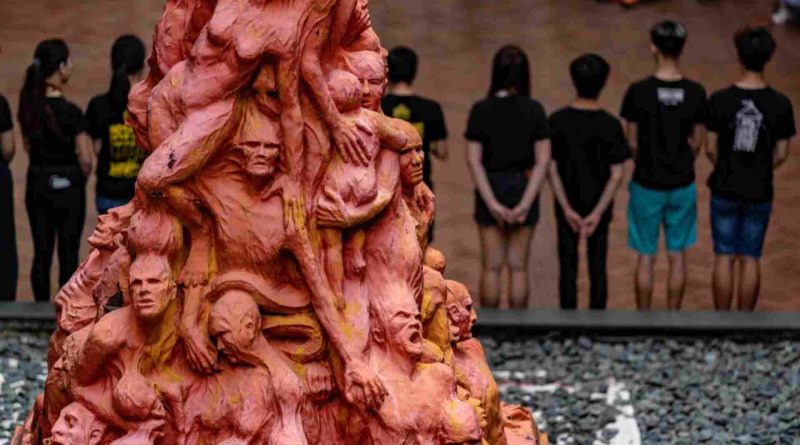Silencing Memory: The Removal of Hong Kong’s Tiananmen Massacre Monument
In a move stirring controversy, Hong Kong University has taken down the statue commemorating the Tiananmen Square massacre of 1989. The 8-meter-tall Pillar of Shame, an artwork by Danish sculptor Jens Galschiot, was removed despite objections from its creator.
Symbolizing the lives lost during the crackdown on pro-democracy protesters in Beijing, the statue portrays 50 twisted bodies piled atop one another. However, disputes surrounding the monument arose in October, prompting the university to demand its removal, despite facing opposition from activists and rights groups.
Galschiot, willing to relocate the statue to Denmark, requested legal immunity from Hong Kong’s national security law. However, negotiations have yet to yield results.
Workers dismantled the monument late Wednesday, amidst drilling sounds and guarded premises. The University of Hong Kong (HKU) confirmed the statue’s removal, citing legal advice and risk assessment as reasons.
The university clarified that no approval was granted for displaying the statue, invoking the colonial-era crimes ordinance to justify its removal. Despite the dissolution of the organizing body, HKU was directed to liaise with the sculptor regarding ownership issues.
Galschiot, asserting his ownership rights, expressed concerns over the statue’s fate and warned of seeking damages if it incurred any harm during removal.
This action occurs in the context of Hong Kong’s tightened political environment following the enactment of the national security law, targeting pro-democracy movements. The law, introduced by Beijing in response to the 2019 protests, has led to the arrest of over 100 activists, sparking criticism over eroding freedoms.
The Pillar of Shame, previously located at Victoria Park, has been a symbol for over two decades, serving as a site for annual commemorations of the Tiananmen massacre. However, recent years have seen increased restrictions, with authorities banning the candlelight vigil citing public health concerns amid the pandemic.
Despite these measures, activists have continued to gather, emphasizing the enduring significance of the memorial and the ongoing struggle for democratic rights in Hong Kong.

